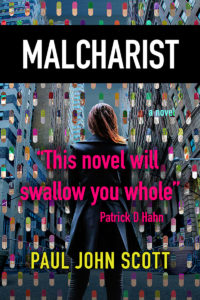
Patrick Hahn has written the first Riff on Malcharist which is now posted on Samizdat reproduced below.
What Paddy Chayefsky’s Network was to the Twentieth Century, Paul John Scott’s Malcharist is to the Twenty-First. This is a novel that takes the reader deep inside the Pharmaceutical Empire which invents diseases, creates “patient advocacy organizations” to sell these diseases to the public, manufactures and controls the evidence base purporting to show their nostrums are safe and effective remedies for these diseases, relentlessly gaslights those unfortunate victims harmed by their patent medicines, and smears all who question any of this as “Luddites, anti-vaxxers, tin-foil hatters, and Scientologists.”
Scott interleaves the stories of the chief protagonists – a hack journalist who has inadvertently stumbles onto the biggest story of his career, a brilliant but disillusioned ghost writer for the drugmakers, a sociopathic talk-show psychiatrist, along with several others, to paint a vivid portrait of a world probably few of us even suspect exists – a world of fantastic opulence kings would envy, along with gutter-level cynicism that would gag a goat.
This novel will swallow you whole. Beginning with the first few pages, a feeling of dread begins to take hold, a sensation that only intensifies as the author takes us through one plot twist after another until the distinction between the good guys and the bad guys becomes hopelessly blurred, while the author’s meticulous attention to detail creates a sensation as close to virtual reality as the printed page will ever get.
To paraphrase Aristotle, you may not be interested in the drug companies, but that won’t stop the drug companies from taking an interest in you. This is a novel everybody needs to read.
By chance there was a homicide last week in Belgium that brings home the themes of Malcharist all too well. Luc Cuvelier got in touch wondering not so much about the homicide as the machinery that swung into place to deny any possible link to the drug the homicider was on. His email is here.
Luc then asks – What do you think about this?
This Belgium story comes straight out of Malcharist. If you want a great picture of a bunch of psychiatrists chomping free food at the pharma trough to prepare them for telling the media that of course no expert would ever make a link between Wellbutrin and a murder like this – read Malcharist.
If you want terrifying descriptions of what the mental state is that drugs can induce that lead on to “suicide” or “homicide” read Malcharist.
If you want a great characterization of Glaxo Wellcome’s and later GlaxoSmithKline’s business plan for drugs like Wellbutrin which include ghostwriting the entire literature on drugs like this and creatively coding the problems out of existence, read Malcharist.
What you don’t have just yet, but coming soon, is Ilse’s parents or maybe children or someone else close to her, becoming a spokesperson in patient groups for the need to make sure we pick up the first hints of depression, this terrible disease, detection in the womb is not too early, to make sure we get people on drugs like Wellbutrin, Pristiq, Spravato and others.
And its almost pointless writing this because as Malcharist will tell you – I’m selling antidepressants by doing so.
But for the record:
Wellbutrin can cause homicide.
Do I know or do Belgian psychiatry know whether it did or not? No-one can know without the full facts of the case and interviewing the boyfriend but the timeframe and the mode of the murder fits very well with the idea that it in fact did cause this homiciede. But for Wellbutrin there is a good chance Ilse would be alive today.
I can say one more thing with confidence – the senior people in whatever Belgian psychiatry organisation is being tapped for a view here almost certainly know nothing about making the kind of assessments needed in a case like this. The common sense of Luc Cuvelier is likely worth a lot more that the combined wits of senior Belgian psychiatrists.
Leave a Reply